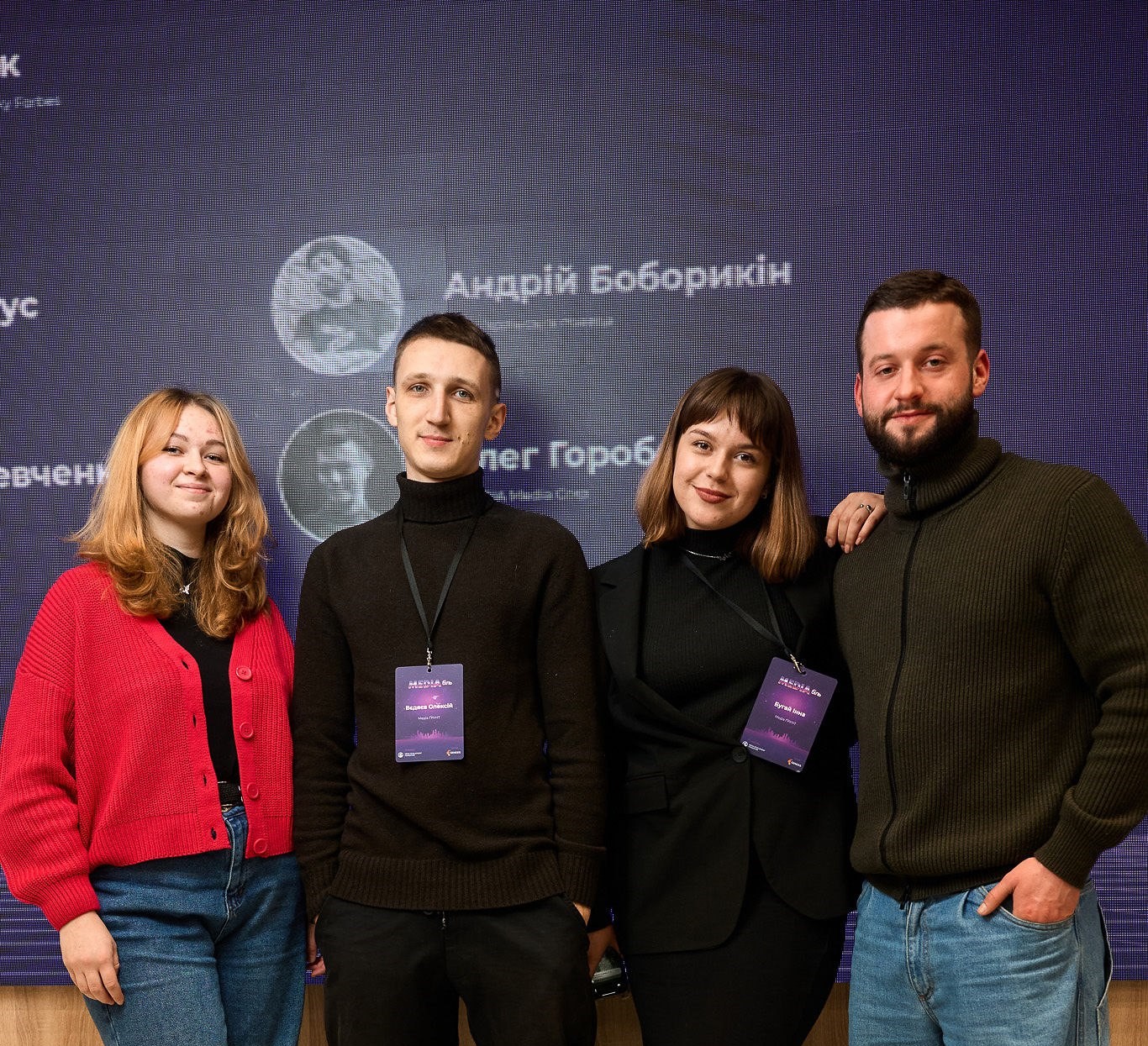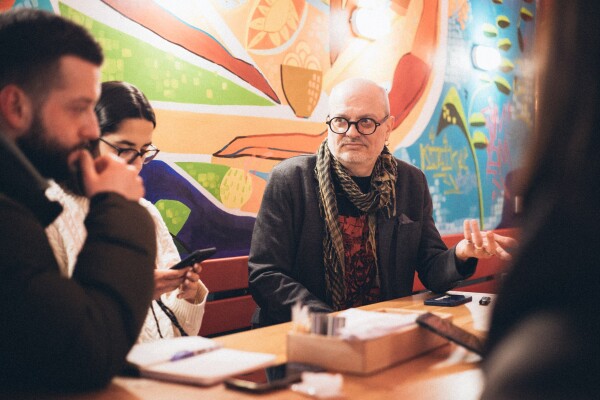
It was on 24 February 2022, on the first day of Russia’s full-scale war against Ukraine, that Valerii Shelupets, then head of a marketing agency in Kyiv, together with blogger Anton Hodza and marketing and brand communications expert Oleksii Viediaiev, contacted journalists and civil society activists to launch a new media that became 'Grunt', or 'Soil' in Ukrainian.
Initially a Telegram channel, Grunt had 150,000 followers within its first three days. It focused on spreading official information about the full-scale invasion, addressing fake news and manipulation, and producing quality content on the ongoing war.
“It was a response to the Russian aggression because there was a ton of different fakes and disinformation”, says Valerii.“Russia was trying to convince Ukrainians that Kyiv would surrender. Our mission was to spread official news and inform the readers without contributing to the state of panic.”
“We had often talked about how Ukraine had no media that acted as the voice of civic activists and civil society,” Valerii says. “We believed we could be that platform as many of our teammates came from activist backgrounds. In the first two months of the all-out-war, we built a newsroom, registered a media, and launched a website to become a fully functioning platform.”
Today, Valerii is the head of Grunt, with Anton as Chief Editor and Oleksii as COO, working with a team of 16 across Ukraine. Many of Grunt’s journalists cover events in the occupied territories and areas most affected by Russia’s invasion, where the security situation is particularly challenging. At Grunt’s main hub in Kyiv, the team continue to adapt to the reality of working with little electricity and ongoing missile strikes.
“The situation in Ukraine is becoming more and more complicated,” Valerii says. “We’re talking about the lack of resources, and there are also the ongoing difficulties of living in a state of war for a long time, and the physical and emotional exhaustion, in addition to other crises. That is the everyday reality of our journalism.”
He admits that with hindsight, launching Grunt was the easy part. Things got more difficult later, when the team struggled to secure finance to keep the newsroom afloat given the worsening economic situation and security threats.
“It is always a challenge to sustain the team because a newsroom cannot run on a voluntary basis forever,” Valerii explains, “A few months after we launched, we already started looking into ways to finance ourselves so we could keep on reporting and remain independent. We did some crowdfunding. We were very happy to receive initial seed-funding from EED.”
Today, Grunt also has over 1,000 paying subscribers, whose contributions cover a significant part of their costs - no easy feat in Ukraine's challenging economic environment but one that demonstrates readers’ support and loyalty to this new publication.
 Exploring new formats to reach new audiences
Exploring new formats to reach new audiencesFrom the beginning, the Grunt team wanted to report on underreported issues in Ukraine and to explore new formats. Today, they cover topics such as war and peace, politics and the economy, disinformation, civil society development and reports from the de-occupied territories of Ukraine.
As part of their initial content, they published reports, videos, and interviews with soldiers on the frontline, including well-known figures in Ukraine such Dmytro 'Da Vinci' Kotsiubailo, a 27-year-old commander who was killed by Russian forces in action in 2023.
The newsroom launched a successful YouTube project called 'The Long War' which explains how Russia was using hybrid warfare against Ukraine many decades before the full-scale invasion. The videos received millions of views and a lot of positive feedback from the audience.
The team also work to raise awareness about the dangers of anonymous Telegram channels to Ukraine’s democracy and media environment. With high popularity since the start of the full-scale war, such anonymous channels spread disnformation to subscribers en masse that aligns with Kremlin narratives and aims to discredit pro-democracy forces. For this, Grunt has faced reprisals. For instance, in September 2023, in partnership with ‘Nashi Hroshi Lviv’ a leading independent centre of investigative journalism, Grunt produced an investigation into Ukraine’s largest Telegram channel, ‘Trukha’, which has 2.5 million subscribers, with the goal of exposing the channel’s lack of transparent ownership, biased information, and lack of adherence to journalistic standards. In response, ‘Trukha’ launched an aggressive disinformation campaign against Grunt, and Valerii notes this experience as an example of the pressures faced by independent media.
 Working closely with its audience
Working closely with its audienceGrunt is particularly popular with young professionals and students who care about what is happening in their country and want to influence its development. Grunt made a conscious decision to understand its audience, carrying out outreach programmes in universities and learning about the interests and topics which mattered to the viewers.
“We analysed our audience’s demands, and we started adapting our content according to our findings,” Valerii explains. “For example, YouTube is very big in Ukraine, especially for our audience, so we’ve been producing a lot of videos. We already have around 200,000 subscribers on YouTube and we get a million views each month. We also don’t compromise on quality, and reporting informs and addresses important issues.”
“Every month, we’ve got content that gets a lot of feedback from our audience, and it motivates us in our work,” says Valerii. “We covered Russia’s attack on Ohmatdyt, Ukraine’s largest children’s hospital, and the Ukrainian solidarity in helping clear the debris amid this tragedy. The day after the attack, there were many false influencers who started spreading Kremlin narratives and manipulating this event to encourage Ukraine to agree to the Russian demands of the so-called Kremlin peace plan. We reported on these influencers and the danger their messages entailed, and we got millions of views and good reviews for this work.”
The team plans to strengthen its multimedia content to become more sustainable over time. Looking to the future, Valerii hopes to continue building a community and an ecosystem of like-minded organisations across Ukraine, which can play a key role in advancing Ukraine’s democracy and developing its vision for the future.
This article reflects the views of the grantees featured and does not necessarily represent the official opinion of the EED.
This initiative was supported thanks to the contributions of the European Commission and of the Government of Canada to EED.